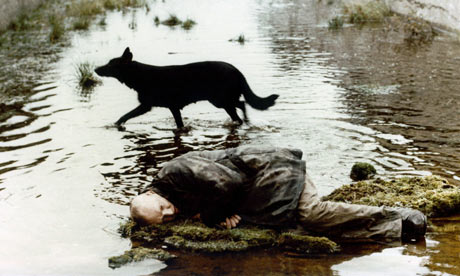Geoff Dyer's irreverent commentary on one of cinema's most 'difficult' offerings is a free-wheeling delight

Tarkovsky's Stalker, a film Geoff Dyer has returned to 'obsessively'. Photograph: The Kobal Collection/Kobal
The films of Andrei Tarkovsky, and in particular his 1979 classic Stalker, have a reputation for being among the most difficult in cinema. Difficult, not just in the sense of intellectually demanding, but difficult as in hard to sit through, long and slow-moving and potentially very boring. Perhaps only the work of the Hungarian director Béla Tarr is viewed (or not, in most cases) with greater trepidation. Cinema buffs wear their familiarity with films such as Stalker and Tarr's seven-hour Sátántangó like a badge of honour and speak of them in reverential tones. Most other people regard them like non-mountaineers regard Everest: "I'm sure it's a great mountain, but damned if I'm climbing it."
 In his new book, Geoff Dyer sets out to address this problem by articulating what he loves so much about Stalker in terms that won't alienate the casual viewer. Zona is an intriguing proposition: Dyer writes about the film in something approaching real time, describing each scene as it happens – almost like a DVD commentary – and pausing at regular intervals to reflect on the making of Stalker, on other films and other works of art, on being Geoff Dyer, and on being Geoff Dyer writing this book about Stalker. Despite operating on many layers, it's not a long book. A fast reader could polish it off in less time than it would take to watch the film itself (163 minutes).
In his new book, Geoff Dyer sets out to address this problem by articulating what he loves so much about Stalker in terms that won't alienate the casual viewer. Zona is an intriguing proposition: Dyer writes about the film in something approaching real time, describing each scene as it happens – almost like a DVD commentary – and pausing at regular intervals to reflect on the making of Stalker, on other films and other works of art, on being Geoff Dyer, and on being Geoff Dyer writing this book about Stalker. Despite operating on many layers, it's not a long book. A fast reader could polish it off in less time than it would take to watch the film itself (163 minutes).
Dyer first saw Stalker in his 20s and, though "slightly bored and unmoved" by it on that first viewing, he has returned to the film obsessively ever since. It may be a great monument looming formidably over 20th-century cinema, but to Dyer it is also a compelling human story that has proved inexhaustibly relevant to his own life and has informed (sometimes in a spookily prophetic way) how we view the world around us.
Tarkovsky's film tells the story of three men breaking into a mysterious sealed-off Zone in an unnamed country (presumably the USSR) and journeying to the even-more-mysterious Room at its heart – a place where, it is said, one's innermost wishes will be granted. Stalker is the name of the guide who leads the group.
It's billed as science-fiction, but if you watched the film with the sound off you'd think it was just three guys wandering around a debris-ridden area of countryside, grumbling at one another. And that may actually be the case: we're never sure if the Zone really does have magical powers, or whether Stalker's tales are merely the kind of superstitions that grow up around areas fenced off by the government. This uncertainty opens up a space for the Russian director to explore some of his favourite themes: the hopelessness of life; the generative power of belief; the plight of the visionary misunderstood by all.
Full review at The Observer
 In his new book, Geoff Dyer sets out to address this problem by articulating what he loves so much about Stalker in terms that won't alienate the casual viewer. Zona is an intriguing proposition: Dyer writes about the film in something approaching real time, describing each scene as it happens – almost like a DVD commentary – and pausing at regular intervals to reflect on the making of Stalker, on other films and other works of art, on being Geoff Dyer, and on being Geoff Dyer writing this book about Stalker. Despite operating on many layers, it's not a long book. A fast reader could polish it off in less time than it would take to watch the film itself (163 minutes).
In his new book, Geoff Dyer sets out to address this problem by articulating what he loves so much about Stalker in terms that won't alienate the casual viewer. Zona is an intriguing proposition: Dyer writes about the film in something approaching real time, describing each scene as it happens – almost like a DVD commentary – and pausing at regular intervals to reflect on the making of Stalker, on other films and other works of art, on being Geoff Dyer, and on being Geoff Dyer writing this book about Stalker. Despite operating on many layers, it's not a long book. A fast reader could polish it off in less time than it would take to watch the film itself (163 minutes).Dyer first saw Stalker in his 20s and, though "slightly bored and unmoved" by it on that first viewing, he has returned to the film obsessively ever since. It may be a great monument looming formidably over 20th-century cinema, but to Dyer it is also a compelling human story that has proved inexhaustibly relevant to his own life and has informed (sometimes in a spookily prophetic way) how we view the world around us.
Tarkovsky's film tells the story of three men breaking into a mysterious sealed-off Zone in an unnamed country (presumably the USSR) and journeying to the even-more-mysterious Room at its heart – a place where, it is said, one's innermost wishes will be granted. Stalker is the name of the guide who leads the group.
It's billed as science-fiction, but if you watched the film with the sound off you'd think it was just three guys wandering around a debris-ridden area of countryside, grumbling at one another. And that may actually be the case: we're never sure if the Zone really does have magical powers, or whether Stalker's tales are merely the kind of superstitions that grow up around areas fenced off by the government. This uncertainty opens up a space for the Russian director to explore some of his favourite themes: the hopelessness of life; the generative power of belief; the plight of the visionary misunderstood by all.
Full review at The Observer
No comments:
Post a Comment